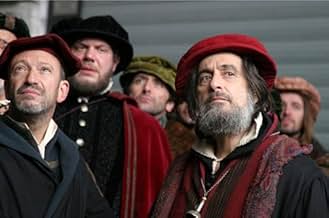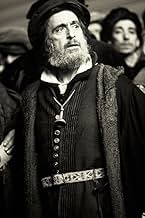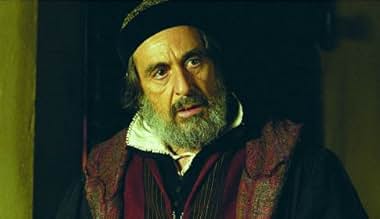Em Veneza do século XVI, quando um comerciante não pode pagar um grande empréstimo de um judeu para um amigo com ambições românticas, o amargamente vingativo credor exige, ao invés disso, um... Ler tudoEm Veneza do século XVI, quando um comerciante não pode pagar um grande empréstimo de um judeu para um amigo com ambições românticas, o amargamente vingativo credor exige, ao invés disso, um pagamento horrível.Em Veneza do século XVI, quando um comerciante não pode pagar um grande empréstimo de um judeu para um amigo com ambições românticas, o amargamente vingativo credor exige, ao invés disso, um pagamento horrível.
- Direção
- Roteiristas
- Artistas
- Indicado para 1 prêmio BAFTA
- 2 vitórias e 7 indicações no total
- Aragon
- (as Antonio Gil-Martinez)
- Direção
- Roteiristas
- Elenco e equipe completos
- Produção, bilheteria e muito mais no IMDbPro
Avaliações em destaque
But Radford makes these scenes much weaker than necessary. For example, he allows the suitors to overact laughably and also cuts their dialog in a way that limits their complexity -- especially with the Duke, who appears stuck-up but smart in the full text, merely stupidly foppish in the movie. In short, Radford wipes out any hope for either comedy or pathos -- both of which can be found in better productions.
In contrast to the cheesy heterosexuality, the clearly homosexual love of Antonio for Bassanio is quite moving, in large part because it's subtly played by an excellent Jeremy Irons. For that matter, Lynn Collins is much better at portraying Portia in drag than Portia the beautiful, expectant young maiden.
Meanwhile, the Shylock plot is compelling as always and benefits from an excellent performance by Pacino. However, a whole strand of Shylock's character has been more or less eliminated. In the full text, Shylock repeatedly makes it clear that he does *not* merely want revenge for mistreatment -- rather he wants to kill Antonio because Antonio is cutting into his business and bringing down interest rates by lending for free:
"I hate him for he is a Christian; but more for that in low simplicity he lends out money gratis, and brings down the rate of usance here with us in Venice."
That's also why Shylock refuses Bassanio's offer of many times more than Antonio owes -- Shylock knows that it still won't equal what he can make in higher interest if Antonio is dead:
"I will have the heart of him, if he forfeit; for, were he out of Venice, I can make what merchandise I will."
To make Shylock more sympathetic, such cold-hearted calculation is excised almost entirely from this screen version.
Still, by making Shylock less an outright villain, the director arguably improves on the original -- Pacino can appear more intriguingly human, less like the Jewish Snidely Whiplash that Shakespeare frequently gives us.
In all, I felt that about two-thirds of this Merchant was excellent drama, and one third was tedious romantic "comedy."
Like so many of Shakespeare's great tragic heroes, Shylock continues to fascinate after 400 years because he is such a difficult and complex character. Pitiful, proud, angry, vengeful, weak, arrogant; his behaviour defies simply analysis and continues to be argued over. He is flawed not because he is a Jew, but because he is human. Rarely do modern screenwriters imbue their creations with such richly textured contradictions, and it is to everyone's benefit that we have Shakespeare to draw on for inspiration.
Shakespearean language is wild and rambling, saturated in multiple meanings, word play and metaphor. To be understood it must be wrangled and tamed by an actor with the strength and knowledge to do so. When an actor fails, the words pour forth in a torrent of incomprehensible words, but when he succeeds, the English language springs to life with an immediacy and vibrancy that takes your breath away. Al Pacino is one such actor, and here displays an incredible level of clarity and control that, were there any justice, would sweep every award in the offering. He meets the challenge of presenting Shylock head on, and delivers an extraordinarily subtle and nuanced performance. It would be a crime if we never got the opportunity to see what he does with King Lear.
The supporting cast is noteworthy. Jeremy Irons gives an original take on the familiar Antonio, presenting an older, quieter figure that displays the unsavoury contradictions between medieval chivalry and ugly prejudice of the time. Joseph Fiennes is a revelation as he matures beyond superficial eye-candy to actually inhabit a character for once. Lynn Collins is the only disappointment. Many of Shakespeare's women are underwritten and require an actor to really work hard to bring them to life, and Collins' Gwyneth Paltrow impersonation seems a little flat and unsuited to the darker tone that Radford is aiming for.
The design team must be acknowledged for creating a unique and thoroughly believable vision of Late Renaissance Venice. The city has not looked this ominous since 'Don't Look Now'. Taking full advantage of extant locations and natural light, the film has an appearance of authenticity that is greatly enhanced by the dark and timeworn costume design. All, again, are worthy of award recognition.
The financial backers of films such as this must be commended. With a budget of $30 million, they must go into such a venture in the full and certain knowledge that they will never make a profit, and yet they invest nonetheless. We can all be grateful for it, as the result is a remarkable adaptation that is sure to be a benchmark for many years to come.
The situations and characters that result are extremely rich, and those are the things we notice and remember. They are rich because of the massive talent in how the small turns of phrase support the larger containing notions.
When the plays were performed in the form Shakespeare understood, there were essentially no sets or props and the actors' priorities were to convey the language. He knew nothing of the modern notion of acting where actors create characters, characters drive situations and situations define or illuminate a larger context. That's all backwards from his magical tradition.
So putting on a Shakespearian play today is a challenge of high order, at least doing it in such a way that the genius of the thing shines through. Otherwise, you have something of which we have hundreds of thousands of examples from lesser talents. It is made ever harder because actors believe Shakespeare was created for them, and actors together with other trades who appreciate their perspective control many creative decisions today.
Matters are much worse when conveying Shakespeare to film. The "language" is different bigger including a growing vocabulary of visual language. And the actors are even more unavoidable.
In "Merchant," Shakespeare's big notions had to do with deviation from law in as many forms as he could fit into the play. Foremost among these was the "law" of the dramatic form; this play famously mixes tragedy and comedy. In tragedy, the characters accidentally fall into the machinery of the universe and get ground up, often accelerated by what they "must" do. (In film that would be "noir.")
In Shakespeare's comedies, the characters understand the rules and are able to play with them without hazard for their amusement. (A film equivalent would be screwball.) So one large notion of dealing with law is the very construction of the play: two different notions of law, one within and the other without. Lynch in "Blue Velvet" would similarly have two genres as conflicting characters.
Shakespeare of course piles dozens of other problems with laws, rules and norms into his story: the Venetian legal system, religious prescriptions, and on and on, even down to the duties of a daughter in carrying out her father's eccentric will.
The magic isn't in any of this, impressive as it is. The magic comes in how he constructs the language and metaphors that dart in and out of the various issues and perspectives. Sometimes a metaphor is captured by itself. Sometimes it stands outside itself. Sometimes it even mocks or annotates itself. Its as if he created molecules that have the same lives as the galaxies and then let all the stuff in the middle (people, cities, religions) just emerge but with rich commentary on the laws of emergence.
We do have very good film adaptations of Shakespeare. "Prospero's Books" is a terrifically deep understanding of the spoken and cinematic languages and the self-reference of explicitly portraying the playwright. Branaugh's "Hamlet" appropriately subordinated images and actors (both excellent in his case) to the narrative in the language. Godard's "Lear" is also good, completely translating and discarding the language. Luhrmann's "Romeo and Juliet" takes the kinds of risks with cinematic poetry and magic the source does with language.
Now this. Much has been made of the anti-Semitism, and some about the overt homosexuality. Both are social constructions much younger than this play. For London audiences, no people they knew could be more cartoonish than Italians: foppish, superficial and lacking introspection. This play is anchored on two characters: the aging gay merchant of the title and a rich, ripe orphan virgin. Both end up in differing intrigues over love for the same pretty boy. Both intrigues involve rules, law and money and the writer has them interact.
The Jew and his daughter are secondary, no more important than the contents of the boxes and portrayed no more ruthlessly than the Italians around him. His engagement is more a device to introduce religious law outside that known to the audience. We add the anti-Semitism here, something the adapter decided to accentuate.
This is a nice movie. Everything about it is pretty. Even the modern constructions of characters by Pacino and Irons have a prettiness to them, As an ordinary movie (like say, "Amadeus") it is a reasonable filler of time if your life is lacking in prettiness.
But the source has something far richer to feed us with, the ability to be in a story and think about that story: to break our narrative eye into dozens of fairies, some of which dance outside the engagement and some that are swept along. None of that conveys here. We are instead locked into a single narrative thread, despite many cinematic techniques from others that would have allowed otherwise.
Radford chooses the gold box. We have the sex, not the love. Our ships are lost.
Ted's Evaluation -- 2 of 3: Has some interesting elements.
From the director of the film version of 1984, Michael Radford has created a masterpiece for everyone to enjoy time and time again.
With an outstanding cast that includes Al Pacino, (Shylock) Joseph Fiennes, (Bassanio) Jeremy Irons, (Antonio) Kris Marshall (Gratiano) and Lynn Collins, (Portia); this beautiful movie is a must see for every Shakespeare enthusiast.
The story is set in 15th century Britain when many Jews were sadly persecuted in the streets for no apparent reason. Bassanio with the help of Antonio visit a wealthy Jewish loan shark called Shylock and ask if they may borrow some money so Bassanio can visit his love, Portia. Shylock agrees but demands a pound of flesh from Antonio if he can not meet his strict payment demands.
A while later Antonio can not pay the loan and Shylock demands his pound of flesh. A ferocious court battle then takes place between the two men as Antonio's friends and family gather round to await his verdict.
This is a remarkable cinematic experience with the passionate Al Pacino at his best. Also look out for the rising young star, Kris Marshall from the hit, Love Actually. He played the part of Gratiano which such emotion and dignity.
This film, which will most certainly be up for Oscars, clearly demonstrates that Shakespeare can still entertain crowds centuries from his death.
The acting was simply superb. Al Pacino was (as ALWAYS) perfect. He captured the torture of emotions that run through Shylock impeccably and easily stole the spotlight whenever he was on screen. Jeremy Irons paved the way for great British acting in his earlier times, and now has done the same. Also Lynn Collins, a fairly recent newcomer was perfect as Portia. She was stunning to look at and managed to pull of the speeches with grace.
Although i have all this praise, the film was definitely over-long and many scenes seemed to me like they could have done with a few edits or too. However, the atmosphere of Venice was amazing and it truly felt real in all the mannerisms of the actors.
Ultimately a very successful and ambitious film, that leaves nothing to the imagination, as it is a very realistic approach to Shakespeare. Beautiful to look at and incredible actors too (especially for Pacino) make this a great film that i would watch again an recommend at the drop of a Venetian hat.
Você sabia?
- CuriosidadesThe bare-breasted prostitutes were not put in the film to make it more risqué, but rather to add a note of historical authenticity. Venetian law at the time required all prostitutes to bare their breasts because the Christian authorities were concerned about rampant homosexuality in their city.
- Erros de gravaçãoIn Venice in 1598 a woman with no head-dress and her hair flowing loose would be taken for a whore, yet this is how Portia frequently appears.
- Citações
Shylock: I am a Jew! Hath not a Jew eyes? hath not a Jew hands, organs, dimensions, senses, affections, passions? Fed with the same food, hurt with the same weapons, subject to the same diseases, healed by the same means, warmed and cooled by the same winter and summer, as a Christian is? If you prick us, do we not bleed? if you tickle us, do we not laugh? if you poison us, do we not die? And if you wrong us, shall we not revenge? If we are like you in the rest, we will resemble you in that. If a Jew wrong a Christian, what is his humility? Revenge. If a Christian wrong a Jew, what should his sufferance be - by Christian example? Why, revenge. The villany you teach me, I will execute, and it shall go hard - but I will better the instruction.
- Cenas durante ou pós-créditosPROLOGUE: "Intolerance of the Jews was a fact of 16th century life even in Venice, the most powerful and liberal city state in Europe."
"By law the Jews were forced to live in the old walled foundry or 'Geto' area of the city. After sundown the gate was locked and guarded by Christians."
"In the daytime any man leaving the ghetto had to wear a red hat to mark him as a Jew."
"The Jews were forbidden to own property. Thus, they practiced usury, the practice of lending money at interest. This was against Christian law."
"The sophisticated Venetians would turn a blind eye to it but for the religious fanatics, who hated the Jews, it was another matter . . . "
- ConexõesFeatured in 'Merchant of Venice': Shakespeare Through the Lens (2005)
- Trilhas sonorasWith Wand'ring Steps
Composed by Jocelyn Pook, Lyrics by John Milton
Arranged by Jocelyn Pook
Performed by Baroque Strings Quartet Ensemble, featuring solo vocals by Andreas Scholl
Harp: Siobhan Armstrong
Psaltery: Harvey Brough
Lute: Elizabeth Kenny
Published by Shylock Ltd / EMI Music Publishing Ltd
© 2004 Decca Music Group Limited
(p) Jocelyn Pook Ltd. /2004 Decca Music Group Limited
Principais escolhas
Detalhes
- Data de lançamento
- Países de origem
- Centrais de atendimento oficiais
- Idiomas
- Também conhecido como
- The Merchant of Venice
- Locações de filme
- Esch-sur-Alzette, Luxemburgo(only Venice film set)
- Empresas de produção
- Consulte mais créditos da empresa na IMDbPro
Bilheteria
- Orçamento
- US$ 30.000.000 (estimativa)
- Faturamento bruto nos EUA e Canadá
- US$ 3.765.585
- Fim de semana de estreia nos EUA e Canadá
- US$ 69.868
- 2 de jan. de 2005
- Faturamento bruto mundial
- US$ 21.560.182
- Tempo de duração2 horas 11 minutos
- Cor
- Mixagem de som
- Proporção
- 2.35 : 1
Contribua para esta página











































